You know that certain fart, which oozes out silent but thick, with a noxious stink that lingers and permeates long after expulsion? That’s mom rage for me: I’m just sitting in this poison gas, and… More
A son made in my image
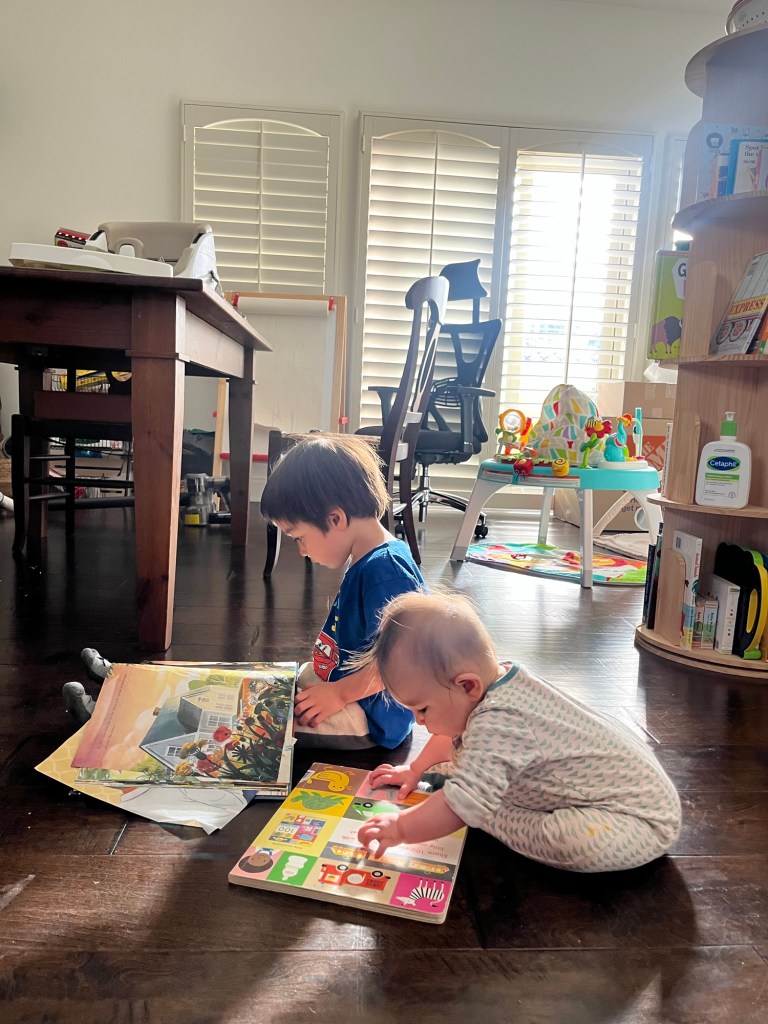
When Tov was first born, I started imagining.
I imagined how our son will grow up, what his personality will be like, what interests and passions will drive him, who he’ll hang out with. Would he be into sports? Music? Art?
That’s what makes the Korean tradition of doljabi so fun, but also laced with anticipation: What destiny will my 1-year-old pick? As parents of young, not-yet-formed human beings, we have the power to present to our children certain life opportunities, but absolutely no control over which path they will pick, and that’s what makes doljabi a fun, light-hearted way to play-pretend. We lay out only the desirable options for our children’s doljabi, but ultimately, our 1-year-old babies will grab whatever their heart fancies.
I remember for my niece’s doljabi, my sister-in-law refused to include a ball because she didn’t want her daughter to go into sports. I didn’t want to offer sports as an option either, but David would be apoplectic if Tov didn’t like baseball, so I reluctantly allowed him to include a baseball, comforted by the fact that neither of us has athletic talents, so most likely, neither will our children. Our doljabi was not very traditional. Because I would love for Tov to become a journalist like me, I added a reporter’s notebook into his doljabi options, and I also included a globe because I wanted him to be well-traveled and globalized in his worldview.
Tov chose the globe. I rejoiced, even as I knew all this is just a game designed to please the parents’ ambitions for their child, nothing more. Even then, I thought, “I don’t care what Tov chooses to be when he grows up, as long as he’s just like his name– a good person, full of God’s goodness. I will be content with whatever he chooses.”
That was then, when Tov was still very young and malleable. Now that Tov is 3, I realize I might be more ambitious than my professed noble goal for my son. I know it, because I have been fighting some rather strong disappointment that my son– my wonderful, adorable, good son, who is indeed so much like his name– does not seem to be much literary-inclined.
Often with firstborns, there are childhood stories that parents repeat to prove their firstborn is special (these kinds of stories seem to diminish with the younger siblings, interestingly enough). For me, apparently I was about 2 when my parents searched all over the house for me until they finally found me hidden behind a pile of books. I had been “reading” for hours, completely engrossed. There’s another story that apparently prove my unique brightness. According to my parents’ folklore, as a child I had very curious, observant eyes. I would stare at things and people with intensity, as though analyzing them in deep thought, and I remember my parents constantly admonishing me to stop staring at strangers.
Now that I think about this, I don’t think it proves anything about my specialness or intelligence; it sounds like I was a pretty creepy child indeed. But all that to say, my parents told these stories proudly to anyone who would listen, which showed a value they upheld and instilled in me: Intellect.
I too uphold this value. I value minds that think and read and create. I admire people who are well-read, who can quote literary giants, who can discuss Dostoevsky and Kierkegaard and C.S. Lewis. If I’m completely honest, I probably uphold that value higher than any other virtues such as goodness, gentleness, self-control. And that value system is becoming more blatantly obvious as I watch Tov grow from a baby to a boy, as I take him to the library and offer to read him books, but he’d rather just run and climb between the bookshelves. Or when five seconds after I pointed out the letter “A” to Tov, he’s already forgotten what it is. My literary ambitions for my child is even more abundantly clear when I meet other kids similar to his age who love reading, have a strong grasp of language, and can recite entire books front to back. I can’t stand those kids. I hate them, really.
One evening, I was trying to read a book with Tov, when as always, he kept grabbing the page from me and interrupting me, fixating on that one page with the picture he likes. “What’s that?” he asked, for the fifteenth time.
“Oh my God, Tov, can I just finish this book!” I cried, losing my patience, yanking the book away and startling the poor little boy, who just wanted to look at the orange ball again and again.
At that moment, so many thoughts were flicking through my head, all poking at perceived flaws in my son: Why can’t Tov just sit through a book? Why does he only want to read this one stupid book? Why doesn’t he like books? Are we letting him watch too many stupid firetruck shows on YouTube? Why hasn’t he learned his letters yet? I’ve been trying to teach him his ABCs for months now! Is it the screen time? My niece could memorize the entire Brown Bear book by his age; why can’t he? God, we need to stop letting him watch shows, it must be rotting his attention span!
Oh, the slash of terror: What if…God forbid, my son never likes to read? What if my son is not very intelligent? What if…Good God!– my son becomes an atrocious writer? And, to my self-dismay, what I felt then was shame. Shame, that my flesh-and-blood might not carry this value that I hold so dear. Shame, at the thought of my son struggling with math and spelling and grammar.
And then, of course, I felt instant shame at my shame. Is this what I’m really all about? I, a professed Christian, called to set apart from the world, has allowed secular standards to infiltrate my value system, and it’s going to impact my parenting and shape my children. But is it not an instinctual, parental desire to create my child to my own likeness?
I wrestled with this thought for months.
I don’t think that wanting my children to love and read books, to have deep critical thinking skills, and to cultivate a rich intellectual mind is a bad thing. I know it’s a worthy and good goal to try to instill these values into my children’s education, which will serve them well in life, and raise them as solid citizens of the world.
It’s also healthy and natural for me to want to share my passions and interests with my own children. Just like David can’t wait to take our children to their first baseball game, I can’t wait to read the Harry Potter books with my children, and also The Good Earth, Jane Eyre, East of Eden, The Brothers Karamazov, and discuss them together.
What I struggle with is how much I want it. How much it’s insidiously tied to my own ego, ambition, and identity. And how disappointed, frustrated, and mad I fear I’ll get if they fail to meet my standards.
People say Tov looks like me, which pleases me, because I think Tov is a very handsome boy— no bias at all. And maybe, if I’m brutally honest, I’d like people to also say Tov is sharp and intelligent because that too reflects well on me. Because those are values I hold high and dear. Because I want Tov to fit my ideals of a worthy person, and create him according to my image, when he has already been wonderfully and fearfully made in the image of God.
As a parent, I have the responsibility to raise my children to be the best person they can be, to stretch their weak points and cultivate their strong points. But it’s also my responsibility– and joy– to get to know and understand who they already are as a person, and delight in how God created them, just as they are. There’s a fine balance between accepting who my child is, and recognizing that they have more potential, and then pushing them lovingly and firmly towards it. It’s this fine balancing act that make my head twirl and my heart clench. Man, parenting requires so much wisdom and discernment. There’s just so many life-altering decisions and judgments that I feel, at this current moment, so ill-equipped to make. Lord, help me.
Tov is still only 3. I have yet to see all the hidden parts of Tov. He has yet to emerge from his chrysalis, yet to fully spread his wings. He might still learn to love books. Or he might not. My brother was raised the same way I was, with the same parents, and he is still not a reader, but he has many other interests and capabilities that I don’t have.
So what can I do?
I still want to do what I can to foster a rich intellectual life for my children. So I plan to take Tov and Woori to the library once a week. I can keep surrounding them with books, keep reading with them, and let them see me read.
And also: I can just relax and enjoy who they are.
That’s easy enough. Tov truly is a wonderful person. He is kind and empathetic and sweet and resilient and curious and fun. He loves his little sister, loves his umma and abba, loves his teachers and friends, loves laughing and rolling and the color pink and fire trucks and Lightning McQueen and listening to music and collecting rocks.
I adore 3-year-old Tov. He makes my heart so full. And I’m so proud to be his umma.
Tov’s first Disneyland trip
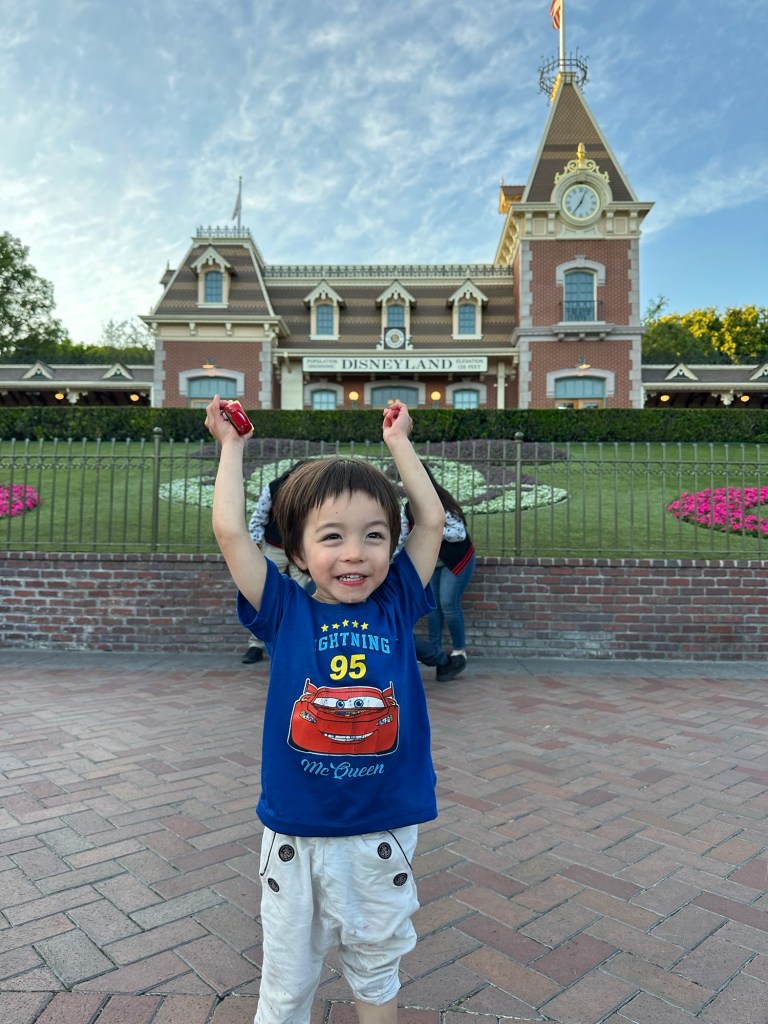
The last time I was at Disneyland was three years ago with David, when Tov was but a fetus tucked into my womb, his presence only having just been revealed to his soon-to-be parents.
It was our babymoon. We booked a hotel near Disneyland, to which I lugged my new best friend, a giant slug of a pregnancy pillow, and then spent a whole day at Disneyland, grousing about the lines and the crowds. I remember for the first time noticing how many strollers there were at Disneyland. I had previously been completely blind to them, but all of a sudden, I noticed parking areas for strollers, double strollers, four-seat quad strollers, bougie strollers, cheap-as-plastic strollers, rental strollers, everrrrrrrywhere. How had I never noticed the tens of thousands of strollers zipping around Disneyland?
Oh, those were my before-kids days, when my eyes didn’t even register babies, toddlers, or any young children whose heads reached under my waist.
Three years later, I am back to Disneyland, this time with an almost-3-year-old and a 8-month-old, testing out our super-nifty, ultra-lightweight Zoe double stroller for the first time. My last visit to Disneyland, my biggest luggage was my pregnancy pillow and my skincare products. This time, I had two full bags jammed with about a dozen different snacks, water bottles, four extra sets of clothes, diapers, wet wipes, teethers, and God knows what else, and I STILL forgot the kids’ sunscreen.
And man, was I excited! It was Tov’s first ever Disneyland experience! We decided to take him there just before he turned 3– young enough not to have to pay a ticket, and old enough to really appreciate the magic of Disney.
“We’re going to Disneyland tomorrow!” I kept telling Tov the day before, and although the kid had no idea what Disneyland or Disney is, has no idea who Mickey and Donald and Goofy are, he grinned and gleamed as though he knew wherever that was, it was gonna be awesome.
The next morning, we woke him up with excited cheers: “We’re going to Disneyland!”
David dressed him in his favorite T-shirt– a hand-me-down, imitation Lightning McQueen blue T-shirt bought from the Philippines– while I bustled around getting all the snacks and my coffee ready, and then we were off! I was so excited I didn’t even fall asleep on our way there.
Oh, the wonderful magic of Disney! First, we got on the 50-minutes-long “line up to get into the car park” ride. And then, we got on the 15-minute “line up to get on the tram” ride. Then! A “line up for the restroom” ride. And then! The “line up for the security screening” line. And then, dum dum dum, here comes the “line up to get through the entrance” line!
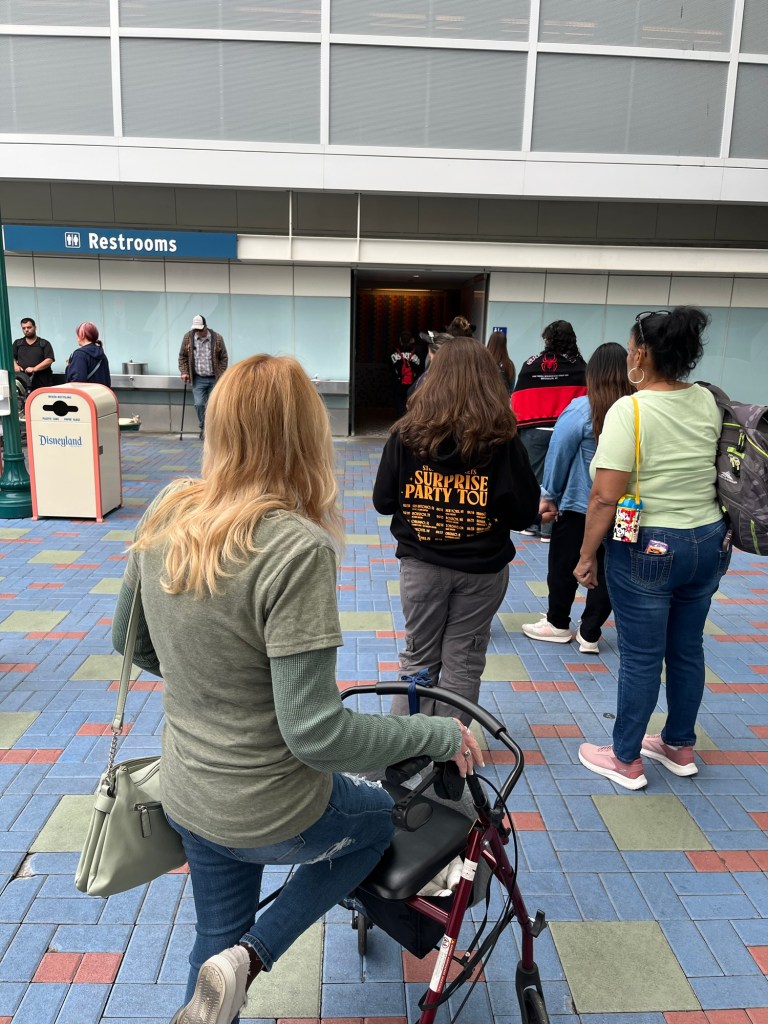
Altogether, it was almost two hours of breathless, thrilling waiting in long lines so that we can line up 40 more minutes for the Astro Orbiter ride, which lasted all of 5 minutes. Is THIS the magic of Disney? We are all magicked into happily lining up for hours and hours under the scorching California sun, grinning and sweating under our Mickey ears, and then leave the park saying, “That was fun! What a great day”
Yes. That’s pretty much how our day went. We spent a small part of our day with my friend Joyce, her husband Tyler, and their sons Cían and Taigh until they left around 2pm, and we chugged on for more than five hours. We rode on a total of four rides. One of them was Pirates, which David was most excited about, except Tov yelled, “I want to go out!” soon after the ride took off.

He loved Astro Orbiter though, and rode it twice– once with David, once with me. It’s this rocket ship ride that lifts you high into the air and spins you round and round, and I HATED every second of it, close to puking and passing out from dizziness. Grimacing, I looked down at my son who was leaning against me, smiling with his mouth open, his hair flailing in the wind, and that redeemed every agonizing second.
After we got off the Astro Orbiter, the ground was still spinning around me, and I felt every ounce of the greasy turkey leg I just ate churning in my stomach like cement in a concrete mixer truck. David tried to take Tov to the Buzz Lightyear Astro Blasters, which we know would be so fun for Tov, but he refused, afraid of the dark indoors, too much like Pirates.
So we ambled instead. We got Tov a strawberry ice cream cone bigger than his face– his first real cone!– and while we sat by the sidewalk, watching all the other Disneylanders pass by, he licked and licked and licked his cone until the whole thing was gone into his belly.
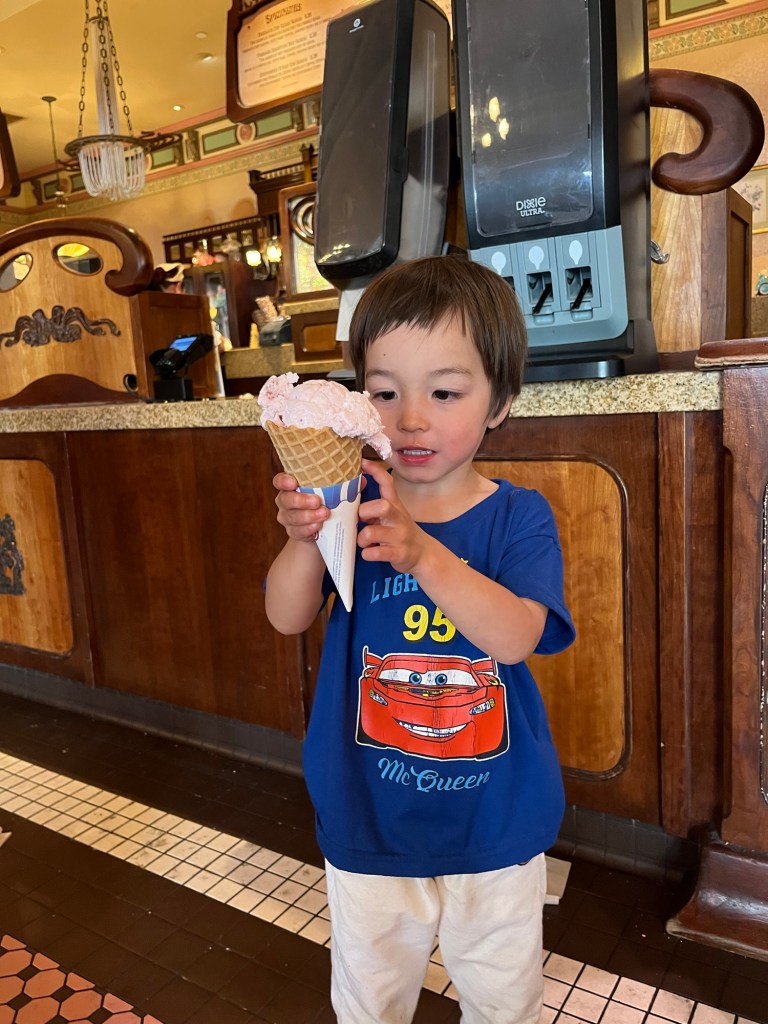
Then, because Tov had been asking for a lollipop all day, David caved and got him a cherry lollipop, also the size of his face.
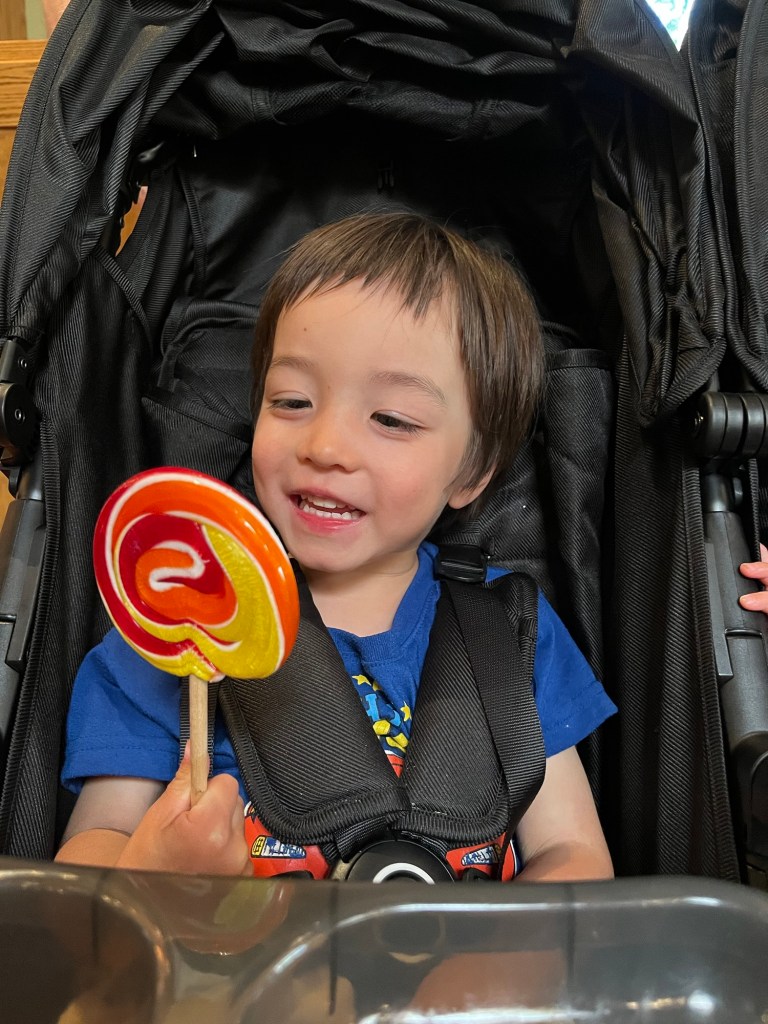
On any other day, I would have gotten very annoyed that we are giving him so much sugar, but I shook it off– eh, it’s Disneyland. There’s only one first experience of Disneyland, and half the joy of Disney is being able to eat all the sugar you want.
Of course, we had to go to California Adventureland, where Tov got to meet his hero, Lightning McQueen, and take a picture with him.
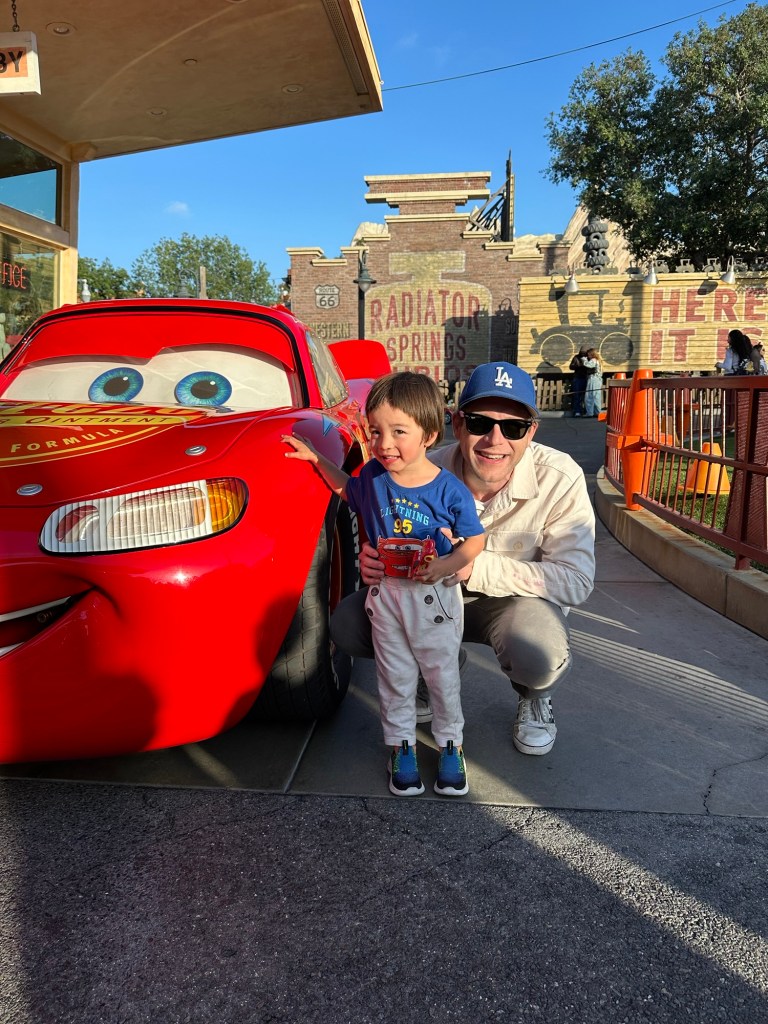
We also got him a set of toy Cars that light up underneath, and oh, the joy on his face! He really doesn’t need more car toys, but really, we bought the set for ourselves– for that momentary, yet eternally pleasing, joy of seeing the delight on his face.

It might have been Tov’s first Disneyland trip, but it was my best Disneyland experience.
I remember the first time I came to Disneyland, I was 12, on a family trip from Singapore to the United States. Back then a Disneyland ticket cost a lot less, but it was still significant, especially for a missionary’s income. I thought it was so magical. I don’t even remember most of the day, but all I remember is how in awe I was of that place, how I deemed it the most magical experience in my life, and to this day, I can still taste the leftover pixie dust from that trip. And I remember too how happy my parents were that day, not because they enjoyed Disneyland, but because they kept looking at our faces, grinning at our grins, excited at our excitement, wondrous at our wonder.
“Did you have fun?” abba kept asking us as the day ended, and each time we nodded happily, he beamed.
And now, full circle, here I am, a mother myself, grinning at my son’s grins, excited at his excitement, wondrous at his wonder, a child again through my child.
I actually did not even mind waiting in line, because that was a rare Tov-and-omma-only time, in which I got to hug him, lift him, spin him, kiss him, for the full 40 minutes we waited in line. I squeezed his hands, still little in my own adult hands, marveling that this boy with a real neck and sweat odor was, last time I was here, a curled, thumb-suckling mystery in my womb.
That chapter of my free, childless days has closed, and then the newborn baby chapter opened and closed, and now here I am, in the last few paragraphs of the toddler chapter, feeling so incredibly thankful and sad at the same time.
While Tov was eating his ice cream and I sat by him, holding Woori and people-watching, I saw an Indian family standing near us. It was an older couple and an old lady in a wheelchair with a long, grey braid, who was, like Tov, licking happily on an ice-cream cone. While we were at Disneyland to treat our child, it was clear they were at Disneyland to treat their mother.
For some reason, that scene moved me. They were enjoying the same moment as David and I, but flipped generationally. For this family, a chapter had opened and closed as well: The chapter of their mother taking care of them had long closed; the chapter of their young parenthood days have also closed; and here they are now, probably with adult children long out of the house, here to relive the Disney magic with their aging mother, before she got too frail for Disney.
I hugged Woori closer to me, as she wobbled on her tippy toes and scratched my face with her sharp tiny nails. She is still a baby now, but the next time we come to Disneyland, she might be a running toddler, and Tov a Kindergartener. And who knows? Maybe one day they’ll be the ones taking David and me to Disneyland in wheelchairs. By then, so many chapters would have opened and closed, opened and closed, each with its dragons and witches, each with its adventures and feasts and magic like this day at Disneyland.
At about 7:30 pm, as both kids started to fade and Tov was no longer running around licking walls and pavements like King Nebuchadnezzar when he turned mad, we got in line to ride the tram back to the parking lot.
In front of us stood a young Arab family, a good-looking couple and their young toddler son. They too were saddled with a stroller and diaper bags and all the goddarn tools a parent needs to keep tantrums and blowouts at bay. As we struggled to hoist all our stuff onto the tram, every one of us weak with exhaustion and overstimulation, the mother commented wryly, “I don’t know why we pay so much to do this.”
But we do it anyway, and we’ll do it again, because that cliche is so true: Time passes so fast. They grow up so fast. And at Disney, time seems to stand still for a day. At Disney, we all turn into a child, from the grey-braided old Indian lady to this young tired mother in a hijab. It doesn’t matter if there are dozens more chapters of our life left, or if we’re on the last chapter— here at Disney, the magic goes on and on, passed from generation to generation.
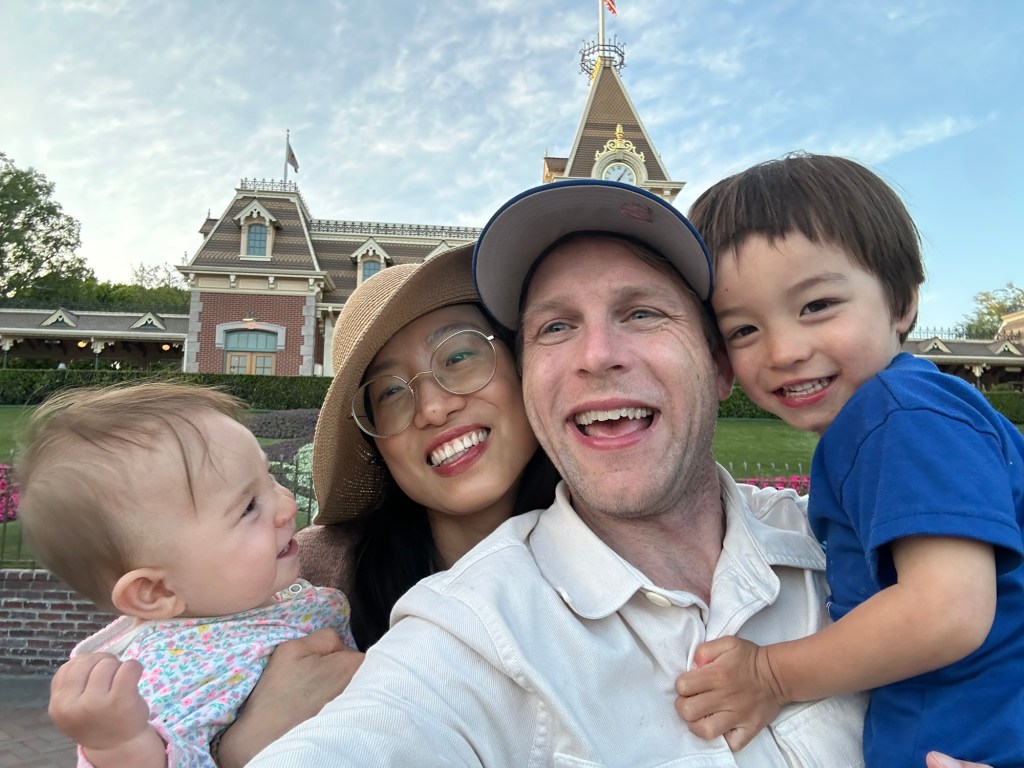
That’s the magic of Disney.
And as David and I drove back onto the 5 freeway, while Woori shrieked in her car seat and Tov complained that the baby is “too loud,” we looked at each other and said, “That was fun! What a great day!”
Saying goodbye to my parents

On February 28, 2025, I dropped my parents off at Hell on Earth, aka LAX, early in the morning. I’ve dropped them off at this airport numerous times. But this time, they weren’t flying back home to Virginia. They flew back to their mother home, South Korea.
They had four luggages and one backpack. For people who had lived so economically and simply, they were shocked by how much stuff they had accumulated over the 24 years they had lived in the United States– mountains and mountains of stuff that they threw out and donated and gave away.
I remember the story my father used to repeat to us, the way patriarchs retell family legends, of them packing all their belongings in Korea into two luggages, and landing in Singapore as fresh missionaries with a 4-year-old and a 2-year-old. My father was filled with ambition; my mother filled with apprehension. Now they return home with twice the luggage, five times the wrinkles, 34 times the lived experience of full-time ministry, and infinite times the joy and gratitude.
Woori was wailing as we drove to the airport that day. She hates being in the car seat, and no matter how many tongue-clucking and funny faces my omma made, she made her displeasure known. So by the time I pulled the Mazda SUV up to the curb of Tom Bradley International Terminal, I was a little frazzled, my overstimulated senses as messy and stuffy as my heart.
We pulled the heavy luggages out to the curb. Then we embraced. Once, twice. I had to let go quickly as I wasn’t technically allowed to park there, but my hugs were also hasty because once I enfolded my arms around my omma and abba, breathing in their familiar scents, touching the bodies that cradled me skin-to-skin from the moment I was born, I didn’t want to let go.
They waved. I waved. Then I hopped into the SUV and pulled out, back into the smoky tunnel of LA morning traffic. And as I drove away, Woori cried, and I too cried.
It is an end to an era.
It is silly, I tell myself, to be this sad. It’s not like my parents are dying, or unreachable. They are simply moving an ocean away, and with technology, I need only tap my screen to see their faces and chat with them. It’s not like I got to see them that often even when they were stateside, since we lived in opposite coasts.
But it does feel, in a way, like death. Or at least, an ending. They have closed down their church of 24 years, the church I grew up in, served in. The church that sent me off to college and then welcomed me back when I dropped out after being hospitalized, and then sent me back off again. The church about which I have complex feelings, the way anyone does with family members squeezed under one roof. The ministry my parents gave more than half their life to is changing. I can no longer go back “home” to Virginia, and that feels sad, even though Virginia hasn’t felt like home in years.
It also feels like a death to my hope that my children will be close to their grandparents. Living overseas, I grew up seeing my own grandparents once every three years, at most, and whenever we visited them, I felt awkward. Each visit was like meeting strangers for the first time. We had almost zero history and shared very little memories and experiences. They didn’t have much to say to me, and I didn’t have much to say to them. I really don’t want that for my own children. The thought of them not knowing their grandparents, not receiving their affection and admonishments and doting, pains me.
But more than anything, this closing of an era is a jolting reminder to me that my parents are aging. During the two weeks they spent with us here in LA before they flew to Korea, I saw my parents get more easily tired. Omma has lost more than 15 pounds and is dealing with health issues, while abba needs a few naps a day to push on. Omma has always been more physically fragile, but Abba to me has always been like an oak tree– thick, strong, unwavering, abounding. Even his voice was like oak– a rich, loud baritone. To see his sparse gray hairs, to hear his cracking voice, I felt fear and anxiety, knowing the thing that most human beings face at some point in their lives– the passing of their parents– is drawing near.
Death was a regular topic while my parents were in LA. For the first time, they told me what they wanted when they died. Both told me they want us to pull the plug should they be in a coma. They want us to scatter their ashes in the mountains. We also talked about what to do if one of them dies before the other. It’s terrible talk, but it needed to be said.
Being a 37-year-old wife and mother is to be sandwiched between two duties– one to the family I’m raising, and the other to the family that raised me. One family is fresh and new, still knobly and plump like buds about to bloom. The other is wilting, the peak season long passed. I myself am in full bloom, but I’m noticing a few petals starting to droop, and I know my peak is over, particularly as I feel the growing aches and creaks of aging. It is a very odd, uncomfortable, conflicting season in life, to be worrying about your kids at the same time you worry about your parents.
I knew my parents would have financial issues. Now that they are no longer receiving an income from the church, they had to figure out a new living situation. They didn’t have anything planned for retirement other than social security. They have no property, no assets. When they applied for a new credit card, the company gave them a $1,000 credit line. They couldn’t even afford to continue staying where they’ve been living for 22 years– a townhouse that’s 40 years outdated, with tiny rooms and laminated kitchen cabinets that are literally falling apart.
That’s how my parents had been living all these years. They tithed about a third of their income to the church. They never considered building wealth, at least not the earthly kind. My mother didn’t once own a designer handbag. My father wore the same suit he bought in Korea decades ago, and his ties were gifted by others. They lived simply and trusted that the Lord will provide.
I have less faith, I suppose. I got a little angry when they refused, several years ago, David’s offer to buy their townhome for them so they didn’t have to worry about housing. I got irritated thinking about this again after they told me they shut down the church. “You should have said yes to David’s offer when you had the chance!” I said to omma.
And that’s when they decided to return to South Korea and apply for dual-citizenship. It was the most practical decision– Korea has great benefits for the elderly so they don’t have to worry about health care; they could comfortably live on their social security there, since housing is cheaper, as long as it’s not in major cities such as Seoul. But they underestimated the cost of housing even in smaller towns. Their budget could only afford old, rundown places in rural villages.
Meanwhile, David and I are renovating our new house. What was originally going to be a bit of a fix-up here and there turned into a full gutting. Basically, we are building a new customized house. Our renovation budget has blown out of proportion and I’m embarrassed to share it. While my parents were here, I was deciding on wall paint colors, and omma accompanied me to get some paint samples, which cost me about $160– for freaking paint SAMPLES! The money we are spending on this house is insane. Three exterior doors cost us $15,000!!!
It just didn’t feel right, that we are building our dream house while my parents look for crappy, bug-infested housing in the countryside. I felt a pang to see how excited my mother was for us. She wanted to know what we’re doing for the kitchen, the bathrooms, the exterior paint, and had plenty of opinions. She told me she enjoys watching home renovation videos on YouTube, something I learned for the first time, and it wrung my heart to realize that she admires a tastefully decorated and designed home but never had the chance to live in one, and in fact, never imagined she could.
So one evening, while my parents watched Tov and Woori, and David and I were on a date, I proposed to David that we help my parents buy a house in Korea. Years ago, David had loaned his brother money for a business project, and his brother was finally returning that sum back to us. Perhaps we could direct those funds to my parents’ housing instead?
I was a little nervous suggesting this to David, not because I thought he’d refuse, but because it puts me in a vulnerable position, and I pride myself for being self-sufficient and independent. And though technically this money belongs to both of us, it’s still a lot of money, and it’s money that came from David’s earning, not mine. So it took a lot of swallows for me to ask David.
I wasn’t surprised when he agreed. I knew he would. But I was still touched beyond words when he did. Turns out, a day ago, he had been listening to a devotion about not storing your treasures on earth but on heaven, and that had made him ponder. Then that Sunday, our pastor preached on the Ten Commandments. To honor your parents, the pastor said, includes providing for them financially in their later years.
What’s more, both of us had been praying about money this year. I’m praying about generosity, and David’s praying about wise stewardship of our finances. The Lord has blessed us financially with a new house, and we want to use it for the glory of Him and the good of others.
All of this didn’t feel like a coincidence. It felt like God was blessing us to bless our parents.
David and I agreed to broach the subject on the last night with my parents before they left LA. I told David I was nervous about bringing it up, because historically, abba has been strongly against receiving any help from us. I had no idea how he would react, and I braced myself for a five-point argument on why he should accept our help. I told David he had to be the one to offer it; it couldn’t come from me. And I told him to emphasize how this conviction came from God.
That night, after dinner, David and I exchanged glances. It’s time, I said with my eyes. David turned on a show on TV so Tov won’t bug us, while I took Woori off her high chair and held her on my lap so she’d be quiet.
“So,” David began. “Sophia and I have been praying about being generous with what God gave us. And I’ve been thinking about how we want to invest with what we have…”
“Oh?” Abba said, having no idea where his son-in-law was going with this.
Well, I was really proud of David that night. He mentioned everything I had hoped he would, and when he was done, my father grasped his hand, nodded, and said, “I receive.” And then he choked up, and said again, “Thank you. Thank you Lord. I receive.”
I was so shocked that I couldn’t believe my ears. Omma was just as incredulous, so she asked him, “Wait, so what do you mean. Does this mean you will accept the money?”
Yes, Abba said. He sees how much the Lord has blessed us, and by accepting it, He too is receiving God’s blessings, and because God blesses those who give, he believes he is also blessing us by receiving it.
I felt my heart release with relief and gladness. Before David and I got engaged, I had actually asked him to use whatever he would have spent on my engagement ring, and donate it instead to my parents’ ministry. That didn’t end up happening, but now that I had more than I could have ever imagined– I, who once couldn’t afford laundry detergent and had to make my own!– it made my heart feel so full that I was able to present this one gift for my parents in their older age, in this new season of their life. This was the first significant financial support I’d ever given my parents. It was also the first step in tilting the balance towards me supporting my parents, rather than them supporting me– an end to an era, indeed.
What made my heart just as full, however, was that David was doing this with me. As I pray about generosity this year, my own husband is showing me how to be generous not just with his finances, but with his heart.
It is easy for me to be generous with my own parents; I would give them part of my liver if they needed it. But it’s not as easy for a son-in-law to be as generous, to treat his wife’s parents as his own. He wasn’t just giving my parents a better house; he was giving them his love, and in there is his love for me. And I think in that moment, my father recognized that too– he was moved not just by the unexpected gift of a house, but by the clear display of a husband’s care and love for his daughter. In this, he saw God’s grace, His love and providence and goodness and faithfulness that have never failed him in his almost 35 years of ministry.
After my parents left to pack up for the next day’s travels, and after David and I had put the kids to bed, I gave my husband a hug.
“Thank you,” I said, tearing up.
“For what?” he said, acting all cool.
“For everything,” I said, and I meant it.
David made a “huh” noise, a sound he makes when he’s pleased but also trying not to sound too pleased about it. Then we talked about the show he’s watching.
We’ve never been a couple who talks all sweet and cooey and sentimental. We reserve nice sappy words for birthday cards, where we don’t have to make eye contact and hear those words out loud, so awkward and unnatural to our ears; we don’t kiss goodnight, we knock heads.
But within that brief exchange was a lifetime of card sentiments– I felt seen, valued, cherished, respected. David’s act of generosity had so many layers of blessings in it, like a mille crepe. He blessed my parents. He blessed me. He blessed our children by showing them what it looks like to honor one’s parents. He blessed my brother, who now can worry less about our parents. He blessed my relatives in Korea, who no doubt will hear from my father how the Lord has blessed him through his son-in-law. This is how true generosity works– it just keeps on giving and giving.
Saying goodbye to my parents felt strange. I felt a little like I was the parent, sending my kid to school for the first time. As the last person to hug them goodbye before they left the U.S., I felt like I was sending them out into the next chapter of their lives. I was a little worried, a little anxious, but also excited and proud. I wanted to cling on, but I had to let go. And I heard God usher them away, saying, “Well done, good and faithful servants.”
And off they go.
